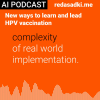Teach to Reach
-
Rethinking human resources for malaria control and elimination in Africa
The comprehensive policy review by Halima Mwenesi and colleagues “Rethinking human resources and capacity building needs for malaria control and elimination in Africa” argues that the stagnation in global malaria progress is fundamentally a human resources crisis rather than solely a biological or technical failure. The authors posit that the current workforce is insufficient in…
Written by

-
Implementation science for planetary health
Remarks about implementation science for planetary health by Reda Sadki, Executive Director, The Geneva Learning Foundation at the Centre for Planetary Health’s research corner meeting, London School of Hygiene & Tropical Medicine (LSHTM) on December 17, 2025. Pauline Paterson (LSHTM): We are really delighted to welcome Reda Sadki. Reda is the Executive Director of the…
Written by

-
Nigeria Immunization Agenda 2030 Collaborative: Piloting a national peer learning programme
Insights report about Nigeria’s Immunization Agenda 2030 Collaborative surfaces surprising solutions for both demand- and supply-side immunization challenges When 4,434 practitioners from all 36 states asked why children in their communities remained unvaccinated, the problems they thought they understood often had entirely different root causes. “I ended up being surprised at the answer I got,”…
Written by

-
Artificial intelligence, accountability, and authenticity: knowledge production and power in global health crisis
I know and appreciate Joseph, a Kenyan health leader from Murang’a County, for years of diligent leadership and contributions as a Scholar of The Geneva Learning Foundation (TGLF). Recently, he began submitting AI-generated responses to Teach to Reach Questions that were meant to elicit narratives grounded in his personal experience. Seemingly unrelated to this, OpenAI just…
Written by

-
AI podcast explores surprising insights from health workers about HPV vaccination
This is an AI podcast featuring two hosts discussing an article by Reda Sadki titled “New Ways to Learn and Lead HPV Vaccination: Bridging Planning and Implementation Gaps.” The conversational format involves the AI hosts taking turns explaining key points and sharing insights about Sadki’s work on HPV vaccination strategies. While the conversation is AI-generated,…
Written by

-
HPV vaccination: New learning and leadership to bridge the gap between planning and implementation
This article is based on my presentation about HPV vaccination at the 2nd National Conference on Adult Immunization and Allied Medicine of the Indian Society for Adult Immunization (ISAI), Science City, Kolkata, on 15 February 2025. The HPV vaccination implementation challenge The global landscape of HPV vaccination and cervical cancer prevention reveals a mix of…
Written by

-
Ahead of Teach to Reach 11, health leaders from 45 countries share malaria experiences in REACH network session
Nearly 300 malaria prevention health leaders from 45 countries met virtually on November 20, 2024, in parallel English and French sessions of REACH. This new initiative connects organizational leaders tackling malaria prevention and control – and other pressing health challenges – across borders. REACH emerged from Teach to Reach, a peer learning platform with over…
Written by

-
You are not alone: Health workers are sharing how they protected their communities when extreme weather hit
Today, The Geneva Learning Foundation launched a new set of “Teach to Reach Questions” focused on how health workers protect community health during extreme weather events. This initiative comes at a crucial time, as world leaders at COP29 discuss climate change’s mounting impacts on health. As climate change intensifies extreme weather events worldwide, health workers…
Written by

-
Why answer Teach to Reach Questions?
Have you ever wished you could talk to another health worker who has faced the same challenges as you? Someone who found a way to keep helping people, even when things seemed impossible? That’s exactly the kind of active learning that Teach to Reach Questions make possible. They make peer learning easy for everyone who…
Written by

